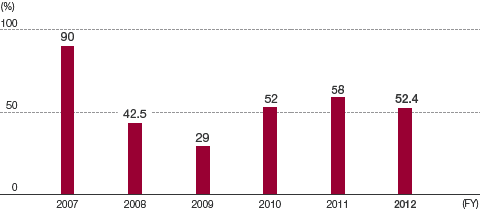 Supporting a Better Work-Life Balance
Supporting a Better Work-Life Balance

Ensuring a good work-life balance
The Advantest Group supports the achievement of a good work-life balance by its employees based on Japan's Next Generation Education and Support Promotion Act. We believe that the work-life balance concept will help make the company a comfortable place to work for all employees and ultimately contribute to increasing our corporate value. Therefore, we are working to reduce overtime hours and create a work environment that facilitates the achievement of a good work-life balance in order to allow our employees to actively pursue their own outside interests and become well-rounded individuals.
The most important issue regarding work-life balance was the reduction of overtime hours. To address this issue, we set the goals specified below and then focused on increasing operational efficiency, encouraging a change in employee mindsets, and making the most of the available work arrangements such as flextime and shift work.
Our goals are:
- Zero employees whose monthly overtime hours are 80 hours or more
- Average monthly overtime hours of 36 or less
We also focused on providing more flexibility in start and finish times and introduced half-day leave slots to make it easier for employees with working spouses to adjust their work schedules so that they can better share household chores and responsibilities.
In fiscal 2012, the company reduced the maximum working hours under Japan's “Article 36 Agreement,” pledged to do everything possible to reduce overtime hours for all employees, and reminded supervisors of their responsibility to ensure that employees do not work excessive hours. As in the previous fiscal year, we continue to make announcements via the public address system urging employees to leave the office on time on Wednesday, and we have been notifying the immediate supervisors of employees found to be working excessive overtime (15 or more hours of overtime already clocked up by the 15th of the month, or 70 or more hours by the 20th and 25th of the month, or three days of holiday worked already by the 20th and 25th). We also made the following arrangements to enhance our employees' work-life balance.
- Employees with a working spouse may now be eligible for the shorter-hours system for childcare/home healthcare duties.
- Employees with childcare/home health care provider responsibilities now have more flexibility regarding start and finish times as an additional measure to the existing flextime system.
- Each employee may now receive five days of annual leave — more than the number required by law — to care for sick or injured children or other family members, and employees may also take half-day leave.
- Conditions on the taking of cumulative paid leave have been relaxed (procedures have been simplified and employees are allowed to take their leave on a half-day basis).
- Flextime arrangements now allow for shorter core times.
- The discretionary work system has been applied to some employment grades.
Although we were able to achieve our goal of fewer than 36 average monthly overtime hours as a result of these initiatives, we were not able to achieve our goal of zero employees working 80 or more monthly overtime hours. The reason was that we had to deal with unexpected problems and meet short lead times. Countermeasures to prevent recurrence were discussed at leader meetings.
We plan to work towards achieving the same goal in fiscal 2013.
We have completed some improvements with regard to the work-life balance issue, and will ensure that all employees are well aware of the new systems and work to improve them while monitoring how they are utilized.
No. of employees to whom special childcare working hours or childcare/home health care flexible start time arrangements applied
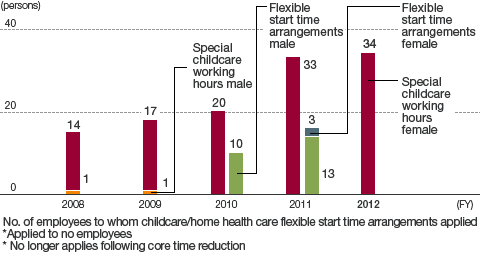
No. of employees who took leave to care for sick or injured children or other family members
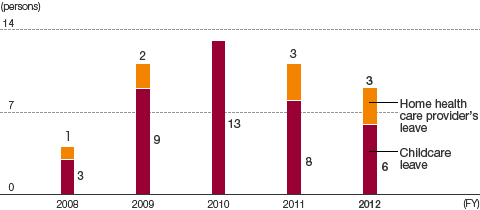
No. of employees who took cumulative paid leave
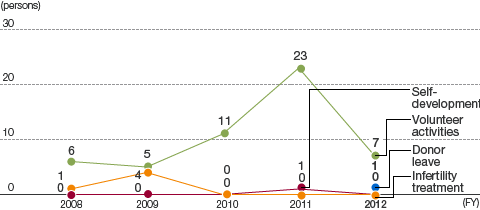
Supporting a better work-life balance
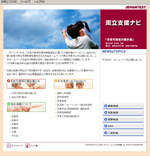
Work-Life Balance Support Guide
The Advantest Group supports the achievement of a good work-life balance by its employees based on Japan’s Next Generation Education and Support Promotion Act. Advantest carries out various measures aimed at helping our employees to balance work with child-rearing while achieving their full individual potential.
Expectant mothers are eligible for paid leave to see their doctor or paid time off in case of a difficult pregnancy (both programs introduced in April 2007,) while employees with young children are entitled to childcare leave of up to two years (introduced in April 2001). Shortened working hours are also available for employees with children up to the third grade.
In 2007, we placed the Work-Life Balance Support Guide on the intranet to gain broader recognition of the various programs Advantest provides and encourage take-up. The guide also offers information on related services provided by local governments. The number of employees on maternity leave as of the end of fiscal 2011 was 25.
Reducing overtime hours
In November 2006 Advantest established the Working Hours Improvement Committee composed of company employees and labor union members for the purpose of reducing overtime hours. In addition, subcommittees set up in each division have studied the causes of overtime work and continued to conduct measures aimed at reducing overtime hours. As a result of these activities, the number of overtime hours per employee did not exceed 30 hours for fiscal 2012.
Reduction of overtime hours per employee (Advantest Corporation)
